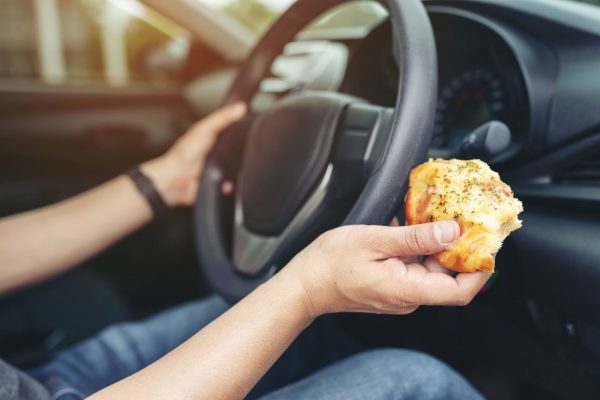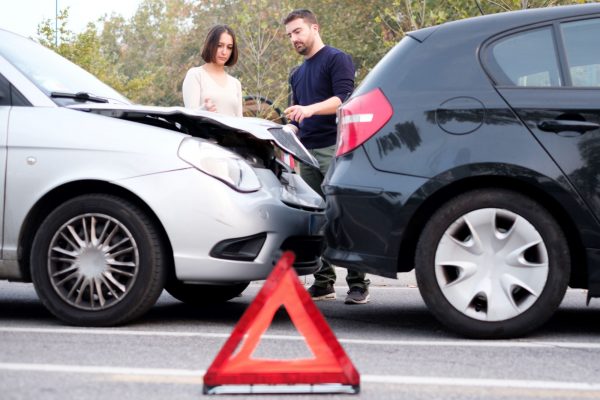Driving without due care and attention explained

Driving without due care and attention, also known as careless or inconsiderate driving, is officially defined by the Road Traffic Act 1988, as:
Driving that falls below the standard expected of a competent driver; or
Driving that does not show reasonable consideration for other persons using the road
Driving without due care is a motoring offence for which the offender could receive a hefty fine or even a ban from driving if they’ve acquired more than 12 points on their licence (six for a newly-qualified driver).
To find out what constitutes ‘driving without due care and attention’ and the penalty for offences that fall under this category, we have put together a guide on everything you need to know.
Examples of careless and inconsiderate driving
Image source: Adobe Stock
According to Sentencing Council, driving without due care includes the following offences:
Excessive speed or aggressive driving
Carrying out other tasks while driving
Tiredness or driving whilst unwell
Driving contrary to medical advice (including written advice from the drug manufacturer not to drive when taking any medicine)
Some other examples of driving without due care and attention include, but aren’t limited to:
Eating, drinking or smoking while driving
Adjusting the radio or media screen while driving
Driving inappropriately close to another vehicle
Driving through a red light
Turning into the path of another vehicle
Colliding with a pedestrian
Undertaking another vehicle (overtaking on the inside)
Middle lane hogging on motorways
Handbrake turns
Operating a sat nav while driving
Overtaking and forcing other vehicles to brake
Ignoring road signs
Using a mobile phone while driving
Multitasking while driving (e.g. reading a map)
Adjusting the position of your seat while driving
Allowing yourself to be distracted by passengers in the car while driving
Swerving across lanes
Using the wrong lane at a roundabout
Some of the driving offences included in the list, such as using a mobile phone while driving, and speeding, also have different endorsement code classes.
What is the difference between dangerous driving and driving without due care and attention?

Image source: Adobe Stock
Careless driving falls below the standard expected of a competent driver and includes driving that does not show reasonable consideration for other persons using the road. Dangerous driving, on the other hand, includes behaviour that could potentially endanger yourself or other drivers.
Dangerous driving encompasses anything from causing death by dangerous driving or driving under the influence of alcohol, to speeding or failing to wear a seatbelt. For more information about dangerous driving, read our guide, ‘Dangerous driving: What counts as a driving conviction?’.
Driving without due care and attention code
The endorsement code for driving without due care and attention is CD10.
A full list of careless driving offence codes, and the sentencing guidelines, can be seen below:
DVLA codeOffencePoints on licenceHow long the points will stay on your licence
CD10The CD10 conviction is given for driving without due care and attention3-94 years
CD20CD20 is given for driving without reasonable consideration for others using the road3-94 years
CD30The CD30 conviction is given for driving without due care and attention or reasonable consideration for others using the road3-94 years
CD40CD40 convictions are given for causing death through careless driving when unfit through drink3-1111 years
CD50CD50 is given for causing death by careless driving when unfit through drugs3-1111 years
CD60CD60 convictions are given for causing death by careless driving when alcohol level is above the limit3-1111 years
CD670CD70 is given for causing death by careless driving then failing to supply a specimen for alcohol analysis3-1111 years
CD80CD80 is given for causing death by careless or inconsiderate driving3-114 years
CD90The CD90 conviction is given for causing death by driving unlicensed, disqualified or uninsured3-114 years
For more information about the different driving offence codes and points, see our guide, ‘Driving endorsement codes and penalty points’.
What is the penalty for driving without due care and attention?

Image source: Adobe Stock
The driving without due care and attention penalty is three to nine licence points or a discretionary disqualification depending on the severity of the offence. You can also be faced with a fine up to £5,000 depending on the nature of the incident.
Endorsement codes CD40-CD90 are given when causing death by driving without due care and attention. The offender could receive a minimum of three and maximum of 11 points on their licence.
In many cases, careless driving will result in a fixed-penalty notice (FPN). Fixed penalty notices are given when police officers observe low-level careless driving that does not cause a collision or injury to a member of the public. Usually, you’ll be given three points on your licence and a £100 fine, although this can vary on a case-by-case basis.
For more information on driving licence points, see our guides:
Is driving without due care and attention a criminal offence?
In short, yes it does count as a criminal offence. If you are convicted of driving without due care and attention the court will endorse your driving record with penalty points.
This endorsement will stay on your record between four to 11 years depending on the type of offence you are found guilty of.
How long do the police have to prosecute for driving without due care and attention?
The police have up to six calendar months to charge you with driving without due care and attention from the date that the offence took place. This is because it is a summary-only offence which can only be heard in a Magistrates’ Court.
Insurance cover for convicted drivers
If you’ve had previous motoring convictions and you’re worried about your insurance rates, we have plenty of convicted driver insurance policies to suit you and your situation. We know your past is not necessarily a guide to the future, which is why we offer high-quality insurance cover whatever your history.
For our best rates, call 0800 369 8590 or book a callback at a time that suits you.






